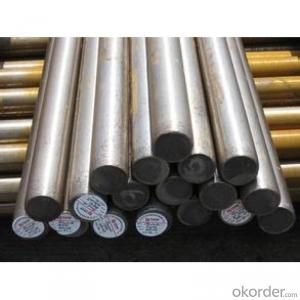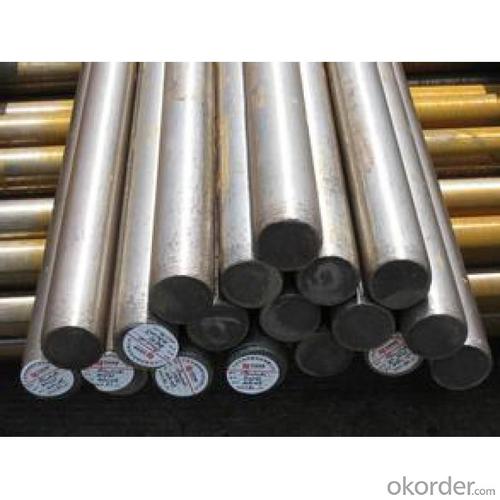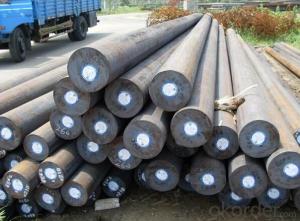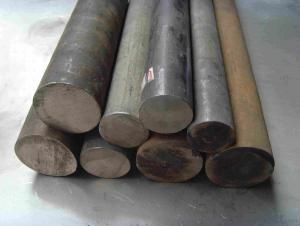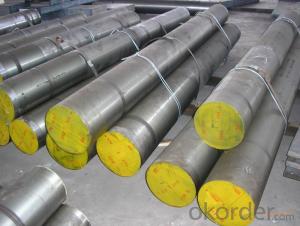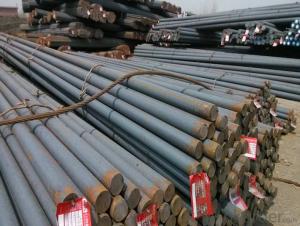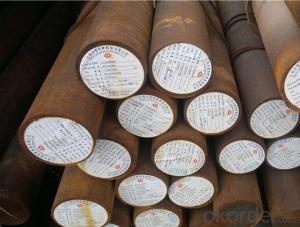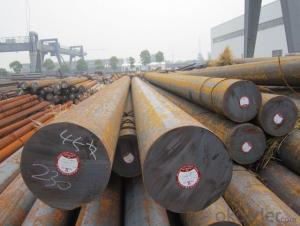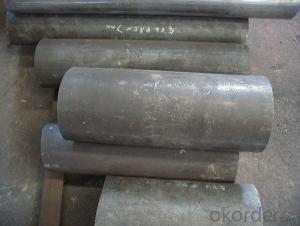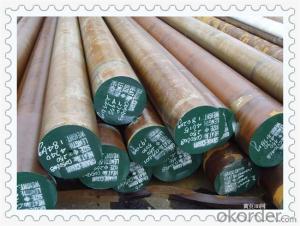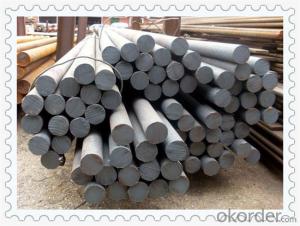Special Steel 1020 Carbon Steel Steel Round Bar
- Loading Port:
- China main port
- Payment Terms:
- TT or LC
- Min Order Qty:
- 25 m.t.
- Supply Capability:
- 10000 m.t./month
OKorder Service Pledge
OKorder Financial Service
You Might Also Like
Specification
The details of our Steel
1. Produce Standard: as the GB, AISI, ASTM, SAE, EN, BS, DIN, JIS Industry Standard
2. Produce processes: Smelt Iron -EAF smelt Billet - ESR smelt Billet -Hot rolled or forged get the steel round bar and plate
3. Heat treatment:
Normalized / Annealed / Quenched+Tempered
4. Quality assurance:
All order we can received Third party inspection, You can let SGS, BV,.. and others test company test and inspect our products before Goods shipping.
Product information
1.Specification of carbon steel 1020 | |||||||||||||
Round bar | Diameter(mm) | Length (mm) | |||||||||||
100~300 | 2000~5800 | ||||||||||||
Plate | Thickness(mm) | Width (mm) | Length (mm) | ||||||||||
20~70 | 105~610 | 2000~5800 | |||||||||||
The specification can be customised! | |||||||||||||
2.Chemical compositon of carbon steel 1020 | |||||||||||||
NO. | C | Mn | Si | Cr | W | V | P | S | |||||
carbon steel 1020 | 0.43~0.50 | 0.60~0.90 | 0.15~0.35 | -- | -- | -- | ≤0.030 | ≤0.030 | |||||
3.Delivery condition of carbon steel 1020 | |||||||||||||
Standard Number | Forging | Annealing | Hardening and Tempering | ||||||||||
carbon steel 1020 | 1100~850 | Subcritical annealing: 650~700 Isothermal annealing: 820~860 | Hardening :820~860 Tempering: 550~660 | ||||||||||
4.Heat treatment of carbon steel 1020 | |||||||||||||
1.Quench:1000-1040`C via 600`C and 850`C, preheating oil or wind cooling 2.Temper temperature should be higher than working temperature in order to stabilize the working size of mold 3.Heat up to 650°C of average temperature in order to eliminate the machined stress, 500 °c air cooling after electric cooker cooling 4.Tempering, 800-850 °c ,slow cooling after diathermia 5. Melting Process of SKD61 steel rod | |||||||||||||
1.EAF: Electric Furnace+LF+VD(Optional) | |||||||||||||
5.Characteristic of carbon steel 1020 | |||||||||||||
Nice machanical porpertys and worse hardenability,so, it is used for machine parts | |||||||||||||
6.Application of carbon steel 1020 | |||||||||||||
(1)Can be made into mould template, mortise pin, column | |||||||||||||
(2)This kind of steel have good mechanical property, is widely used in structural parts which may support stress alternation, especially made into some connecting rods, bolts, wheel gear. | |||||||||||||
(3)This kind of steel is the most common blanks and materials of shaft parts. | |||||||||||||
Main product
High speed steel | |
AISI | M2,M4,M35,M42,T1 |
DIN | 1.3343,1.3243,1.3247,1.3355 |
JIS | SKH51,SKH54,SKH35,SKH59,SKH2 |
Cold work tool steel | |
AISI | D2,D5,D3,D6,A8,A2,O1 |
DIN | 1.2379,1.2601,1.2080,1.2436,1.2631,1.2363,1.2510,1.2327 |
JIS | SKD10,SKD11,SKD1,SKS3 |
Hot work tool steel | |
AISI | H13,H11,H21 |
DIN | 1.2344,1.2343,1.2367,1.2581,1.2713 |
JIS | SKD61,SKD6,SKD7,SKD5SKT4 |
Plastic mould steel | |
AISI | P20,P20+Ni,420 |
DIN | 1.2311,1.2738,1.2083,1.2316 |
JIS | PDS-3,SUS420J1,SUS420J2 |
Alloy structural seel | |
AISI | 5140,4340,4135,4140 |
DIN | 1.7035,1.6511,1.7220,1.7225 |
JIS | SCr440,SNCM439,SCM435,SCM440 |
Stainless steel | |
AISI | 440C,420,430 |
DIN | 1.4125 |
JIS | SUS440C |
Carbon steel | |
AISI | 1045,1020 |
DIN | 1.1191 |
JIS | S45C, G3101 |
Product show

Workshop show

Shipping
1. FedEx/DHL/UPS/TNT for samples, Door-to-Door;
2. By Air or by Sea for batch goods, for FCL; Airport/ Port receiving;
3. Customers specifying freight forwarders or negotiable shipping methods!
Delivery Time: 3-7 days for samples; 5-25 days for batch goods.
Payment Terms
1.Payment: T/T, L/C, Western Union, MoneyGram,PayPal; 30% deposits; 70% balance before delivery.
2.MOQ: 1pcs
3.Warranty : 3 years
4.Package Informations: 1) EXPORT, In 20 feet (GW 25 ton) or 40 feet Container (GW 25 ton)
2)as customer's requirement
Why choose us?
(1) The leading exporter in China special steel industry.
(2) Large stocks for various sizes, fast delivery date.
(3) Good business relationship with China famous factories.
(4) More than 7 years steel exporting experience.
(5) Good after-sales service guarantee.
- Q: How does special steel contribute to the aerospace aftermarket industry?
- Special steel plays a crucial role in the aerospace aftermarket industry by providing critical components that are essential for the safe and efficient operation of aircraft. The high strength, durability, and temperature resistance of special steel make it an ideal material for various aerospace applications. One of the primary ways special steel contributes to the aerospace aftermarket industry is through the production of engine components. Special steel alloys, such as nickel-based superalloys, are used to manufacture turbine blades, compressor discs, and shafts, which are vital elements of jet engines. These components must withstand extreme temperatures, pressures, and mechanical stresses, and special steel alloys offer the necessary properties to ensure reliable and long-lasting performance. Moreover, special steel is also used in the manufacturing of structural components in aircraft. Steel alloys with high strength-to-weight ratios, such as titanium alloys, are employed for the construction of critical parts like landing gear, wing spars, and fuselage frames. These components need to be both lightweight and strong to withstand the forces and stresses experienced during flight. Special steel alloys provide the required mechanical properties to ensure the structural integrity and safety of the aircraft. In addition to engine and structural components, special steel also contributes to the aerospace aftermarket industry through the production of fasteners, bearings, and other small yet vital parts. These components are responsible for holding various parts together and ensuring proper functioning of systems. Special steel alloys with excellent corrosion resistance, fatigue strength, and wear resistance are utilized to ensure the reliability and longevity of these critical components. Furthermore, special steel plays a crucial role in the maintenance, repair, and overhaul (MRO) activities of the aerospace aftermarket industry. With the rigorous demands placed on aircraft components, regular inspections, repairs, and replacements are necessary to ensure their continued airworthiness. Special steel materials are often used for MRO purposes due to their compatibility with existing aircraft systems and their ability to meet the stringent requirements of aerospace regulations. Overall, special steel is an indispensable material in the aerospace aftermarket industry. Its unique properties and characteristics enable the production of high-performance engine components, lightweight structural parts, and reliable small components. The use of special steel ensures the safety, efficiency, and longevity of aircraft, contributing to the overall success and growth of the aerospace aftermarket industry.
- Q: What are the different classifications of special steel?
- Special steel is a broad term that encompasses various types of steel alloys that possess unique properties and characteristics, making them suitable for specific applications. There are several classifications of special steel, including: 1. Stainless Steel: This type of special steel contains a high percentage of chromium, which provides excellent corrosion resistance. It also typically contains other elements like nickel and molybdenum, enhancing its strength and durability. Stainless steel is commonly used in applications that require resistance to oxidation, heat, chemicals, and wear, such as in food processing, medical devices, and construction. 2. Tool Steel: Tool steel is specifically designed for manufacturing tools, dies, and molds. It is known for its exceptional hardness, wear resistance, and toughness. Tool steel is further classified into several subcategories, including high-speed steel (HSS), cold work steel, hot work steel, and plastic mold steel, each tailored for specific tooling applications. 3. Alloy Steel: Alloy steel is a type of special steel that contains additional alloying elements apart from carbon. These elements, such as manganese, silicon, nickel, chromium, and molybdenum, are added to enhance specific properties like strength, toughness, hardenability, and corrosion resistance. Alloy steels are used in various applications, such as automotive components, machinery, construction, and aerospace. 4. Spring Steel: This type of special steel is specifically designed to withstand repeated bending or twisting without permanently deforming. Spring steel has excellent elasticity and fatigue resistance, making it suitable for applications such as springs, suspension systems, and high-performance automotive parts. 5. Bearing Steel: Bearing steel is engineered to provide high hardness, wear resistance, and dimensional stability necessary for manufacturing bearings. It typically contains high levels of carbon, chromium, and other alloying elements, ensuring the required mechanical properties for reliable and long-lasting bearings. 6. Electrical Steel: Electrical steel, also known as silicon steel, is specifically designed for electrical applications. It possesses low electrical resistivity and high magnetic permeability, allowing it to efficiently conduct and transform electrical energy. Electrical steel is commonly used in transformers, electric motors, and generators. These classifications of special steel highlight the versatility and tailored properties of different steel alloys, enabling their application in a wide range of industries and specialized uses.
- Q: How does special steel contribute to the performance of cutting tools?
- Special steel contributes to the performance of cutting tools in several ways. Firstly, it offers exceptional hardness and strength, enabling the cutting tool to withstand the high forces and pressures encountered during cutting. This durability ensures that the tool remains sharp for longer periods, reducing the need for frequent replacements. Additionally, special steel also possesses excellent heat resistance, preventing the tool from overheating and maintaining its cutting ability. Moreover, special steel can have specific alloying elements that enhance wear resistance, corrosion resistance, and toughness, further improving the performance and lifespan of cutting tools. Overall, the use of special steel in cutting tools enhances their efficiency, reliability, and longevity, resulting in improved cutting precision and reduced downtime.
- Q: What are the factors that affect the fatigue strength of special steel?
- There are several factors that can affect the fatigue strength of special steel. These include the composition and microstructure of the steel, the presence of defects or impurities, the surface finish and treatment, the loading conditions and stress levels, and the temperature and environmental conditions in which the steel operates. Additionally, factors such as heat treatment, alloying elements, and manufacturing processes can also impact the fatigue strength of special steel.
- Q: How does special steel contribute to the creep resistance of products?
- The creep resistance of products is aided by special steel due to its distinct properties and composition. Creep, which refers to the gradual deformation of a material under constant stress over time, is a significant concern in industries that involve high temperatures and prolonged usage. To combat this, special steel, also known as high-temperature steel or heat-resistant steel, is specifically designed to endure these extreme conditions and minimize creep. The high melting point of special steel is one of the key factors that contribute to its resistance against creep. Typically, special steel is alloyed with elements like chromium, nickel, molybdenum, and vanadium, which considerably elevate its melting point compared to regular steel. This increased heat resistance enables special steel to retain its structural integrity and resist deformation even when exposed to elevated temperatures. The unique microstructure of special steel also plays a crucial role in its ability to resist creep. Engineers deliberately create a fine-grained structure in special steel, which enhances its strength and hinders the movement of dislocations within the material. Dislocations are imperfections in the atomic arrangement of a material that can lead to creep deformation. By minimizing dislocation movement, special steel exhibits greater resistance to creep and maintains its shape and dimensional stability over extended periods. Additionally, special steel often has a higher content of certain alloying elements. For example, the addition of elements like molybdenum and vanadium enhances the creep strength of special steel by forming stable carbides within the material. These carbides act as barriers to dislocation movement, further hindering creep deformation and improving the overall resistance to creep. Advanced heat treatment processes, such as quenching and tempering, are frequently employed on special steel to optimize its mechanical properties and enhance its resistance against creep. These heat treatments refine the microstructure, improve the distribution of alloying elements, and increase the hardness and strength of the material, all of which contribute to better resistance against creep. In summary, special steel's ability to withstand high temperatures, its unique microstructure, and its alloying elements and heat treatment processes collectively provide exceptional resistance against creep. As a result, special steel is an ideal choice for various applications that require durability and longevity under extreme thermal conditions, such as gas turbines, nuclear reactors, high-temperature boilers, and aerospace components.
- Q: How does special steel contribute to sustainable development?
- Special steel contributes to sustainable development in several ways. Firstly, it is highly durable and long-lasting, reducing the need for frequent replacements and the associated resource consumption and waste generation. Additionally, special steel is often used in energy-efficient applications, such as in the construction of wind turbines or energy-efficient vehicles, helping to reduce carbon emissions and combat climate change. Furthermore, special steel can be recycled and reused, minimizing the demand for virgin materials and reducing the environmental impact of the steel industry. Overall, the use of special steel promotes sustainable practices by extending product lifecycles, reducing energy consumption, and supporting a circular economy.
- Q: What are the main characteristics of structural steel?
- The main characteristics of structural steel include high strength, durability, versatility, and cost-effectiveness. It has a high strength-to-weight ratio, allowing for the construction of large and complex structures with minimal material usage. It is also resistant to corrosion and can withstand extreme weather conditions, making it suitable for both indoor and outdoor applications. Additionally, structural steel is highly versatile, as it can be easily fabricated, modified, and reused. Its cost-effectiveness is another key characteristic, as it offers long-term value due to its low maintenance requirements and ability to withstand heavy loads.
- Q: How does special steel perform in cryogenic gas environments?
- Special steel performs well in cryogenic gas environments due to its unique properties. It has excellent resistance to low temperatures and maintains its strength and toughness even at extremely cold temperatures. This makes it highly suitable for applications in cryogenic gas environments where traditional steel may become brittle or lose its strength. Additionally, special steel's resistance to corrosion and thermal expansion further enhances its performance in these extreme conditions.
- Q: What are the common heat treatment methods used for special steel?
- There are several common heat treatment methods used for special steel to improve its mechanical properties and enhance its performance. Some of these methods include: 1. Annealing: This process involves heating the steel to a specific temperature and then cooling it slowly to relieve internal stresses and create a refined microstructure. Annealing helps to improve the machinability and ductility of the steel. 2. Normalizing: Normalizing is a heat treatment method that involves heating the steel to a temperature above its critical point and then cooling it in still air. This process helps to refine the grain structure of the steel, improve its toughness, and enhance its strength. 3. Quenching: Quenching is a rapid cooling process that involves immersing the steel in a quenching medium, such as water, oil, or polymer. This method is used to increase the hardness and strength of the steel by forming a hard martensitic structure. However, quenching can also introduce internal stresses and reduce the steel's toughness, so it is often followed by tempering. 4. Tempering: Tempering is a heat treatment method that involves reheating the quenched steel to a specific temperature and then cooling it gradually. This process helps to relieve internal stresses, reduce hardness, and improve the toughness and ductility of the steel. Tempering also helps to enhance the steel's resistance to brittle fracture. 5. Austempering: Austempering is a heat treatment method that involves quenching the steel to a temperature just above its martensitic transformation range and then holding it at this temperature until the austenite transforms into bainite. This process produces a unique microstructure that provides a combination of high strength and good toughness. 6. Martempering: Martempering is similar to austempering, but the steel is quenched to a temperature just below its martensitic transformation range and then held at this temperature until the transformation is complete. Martempering produces a microstructure with improved strength and toughness compared to conventional quenching. These heat treatment methods are commonly used for special steel to tailor its properties to specific applications and requirements. The choice of method depends on factors such as the desired mechanical properties, the steel's composition, and the intended use of the final product.
- Q: What are the different testing methods for special steel?
- There are various testing methods for special steel, including hardness testing, tensile testing, impact testing, metallographic testing, and non-destructive testing. Each method helps assess different properties of the steel, such as strength, toughness, microstructure, and defects, ensuring its quality and suitability for specific applications.
Send your message to us
Special Steel 1020 Carbon Steel Steel Round Bar
- Loading Port:
- China main port
- Payment Terms:
- TT or LC
- Min Order Qty:
- 25 m.t.
- Supply Capability:
- 10000 m.t./month
OKorder Service Pledge
OKorder Financial Service
Similar products
Hot products
Hot Searches
Related keywords
